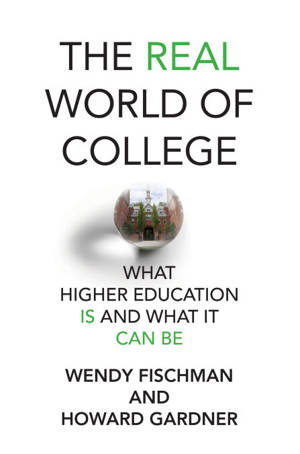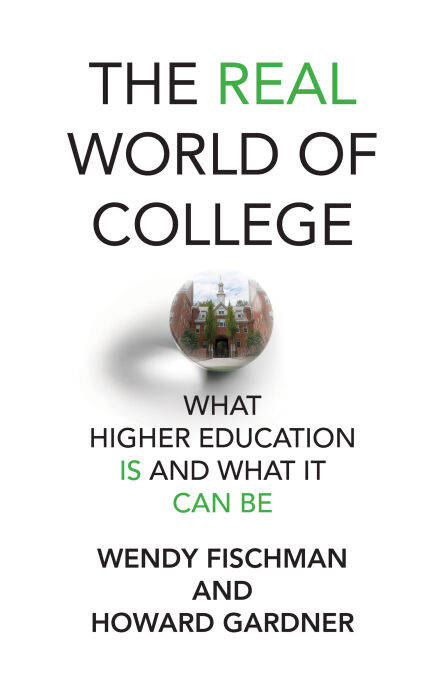
Bedankt voor het vertrouwen het afgelopen jaar! Om jou te bedanken bieden we GRATIS verzending (in België) aan op alles gedurende de hele maand januari.
- Afhalen na 1 uur in een winkel met voorraad
- In januari gratis thuislevering in België
- Ruim aanbod met 7 miljoen producten
Bedankt voor het vertrouwen het afgelopen jaar! Om jou te bedanken bieden we GRATIS verzending (in België) aan op alles gedurende de hele maand januari.
- Afhalen na 1 uur in een winkel met voorraad
- In januari gratis thuislevering in België
- Ruim aanbod met 7 miljoen producten
Zoeken
The Real World of College E-BOOK
What Higher Education Is and What It Can Be
Wendy Fischman, Howard Gardner
E-book | Engels
€ 24,59
+ 24 punten
Uitvoering
Omschrijving
Why higher education in the United States has lost its way, and how universities and colleges can focus sharply on their core mission.
For The Real World of College, Wendy Fischman and Howard Gardner analyzed in-depth interviews with more than 2,000 students, alumni, faculty, administrators, parents, trustees, and others, which were conducted at ten institutions ranging from highly selective liberal arts colleges to less-selective state schools. What they found challenged characterizations in the media: students are not preoccupied by political correctness, free speech, or even the cost of college. They are most concerned about their GPA and their resumes; they see jobs and earning potential as more important than learning. Many say they face mental health challenges, fear that they don’t belong, and feel a deep sense of alienation. Given this daily reality for students, has higher education lost its way? Fischman and Gardner contend that US universities and colleges must focus sharply on their core educational mission.
Fischman and Gardner, both recognized authorities on education and learning, argue that higher education in the United States has lost sight of its principal reason for existing: not vocational training, not the provision of campus amenities, but to increase what Fischman and Gardner call “higher education capital”—to help students think well and broadly, express themselves clearly, explore new areas, and be open to possible transformations. Fischman and Gardner offer cogent recommendations for how every college can become a community of learners who are open to change as thinkers, citizens, and human beings.
For The Real World of College, Wendy Fischman and Howard Gardner analyzed in-depth interviews with more than 2,000 students, alumni, faculty, administrators, parents, trustees, and others, which were conducted at ten institutions ranging from highly selective liberal arts colleges to less-selective state schools. What they found challenged characterizations in the media: students are not preoccupied by political correctness, free speech, or even the cost of college. They are most concerned about their GPA and their resumes; they see jobs and earning potential as more important than learning. Many say they face mental health challenges, fear that they don’t belong, and feel a deep sense of alienation. Given this daily reality for students, has higher education lost its way? Fischman and Gardner contend that US universities and colleges must focus sharply on their core educational mission.
Fischman and Gardner, both recognized authorities on education and learning, argue that higher education in the United States has lost sight of its principal reason for existing: not vocational training, not the provision of campus amenities, but to increase what Fischman and Gardner call “higher education capital”—to help students think well and broadly, express themselves clearly, explore new areas, and be open to possible transformations. Fischman and Gardner offer cogent recommendations for how every college can become a community of learners who are open to change as thinkers, citizens, and human beings.
Specificaties
Betrokkenen
- Auteur(s):
- Uitgeverij:
Inhoud
- Aantal bladzijden:
- 408
- Taal:
- Engels
Eigenschappen
- Productcode (EAN):
- 9780262368520
- Verschijningsdatum:
- 21/03/2022
- Uitvoering:
- E-book
- Beveiligd met:
- Adobe DRM
- Formaat:
- ePub

Alleen bij Standaard Boekhandel
+ 24 punten op je klantenkaart van Standaard Boekhandel
Beoordelingen
We publiceren alleen reviews die voldoen aan de voorwaarden voor reviews. Bekijk onze voorwaarden voor reviews.









